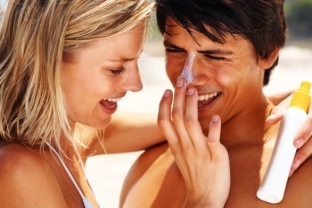Summer enters its "velvet" stage, and many of those who did not manage to take advantage of the holidays in previous months are happy to go closer to the sea and the beach. Therefore, cosmetologists have to continue to persistently remind their patients about how to avoid mistakes during the holidays that can negate all the joint skin care efforts during the previous year. What mistakes do patients make under the hot sun, and how they threaten the skin and hair, reminds estet-portal.com.
How to avoid becoming a victim of ultraviolet radiation: the right sun protection
Despite numerous and relentless warnings that the sun's active ultraviolet rays can be harmful, women continue to expose their bodies to the hot rays. Many of the patients, returning after a vacation with clear signs of photoaging of the skin, justify themselves by going to the beach exclusively in the mornings and thickly smearing sunscreen, but they could not protect themselves from trouble. We remind you of some mistakes that result in skin and hair problems.
Error #1. Being on the beach without a tent.
Indeed, from 9 to 11.30 the sun is considered less aggressive, so you can safely go to the beach, but be sure to put on a hat and sit under an awning. Dermatologists have been diagnosing more and more skin cancers in recent years. Perhaps this is the merit of improved diagnostic devices, but rather the reason is the excessive gullibility of women who consider themselves safe in the early morning, when you can not strain too much with skin protection.
Error #2. Stop using sunscreen when your skin starts to tan.
Many people think that in the first days of a beach holiday, it is necessary to apply a cream with a maximum sun protection factor in order to protect yourself from sunburn. When the skin is at least a little rosy, the cream is no longer applied at all.
We remind patients that the sun's rays that our skin perceives have a different spectrum. Some of the rays cause the production of melanin – cause tanning, while others penetrate deep into the skin up to the reticular layer of the dermis, damaging collagen fibers along the way and activating endopeptidases that can destroy any proteins of the extracellular matrix.
Ignoring sun protection means hyperpigmentation, dryness and sagging of the skin, the appearance of vascular networks and other signs of photoaging. The optimal solution is considered to be a gradual decrease in the protection factor in the creams used
Error #3. Avoid sunscreen for acne.
There is a belief that sun exposure reduces sebum production, so problematic skin becomes healthier. Many doctors hear from their regular acne patients that their skin felt great during a beach holiday, but the disease worsened significantly upon their return.
It is imperative to warn patients with problematic skin that under the influence of aggressive sun, local immunity decreases in the skin, it loses a lot of moisture, and the sebaceous glands cannot produce sebum. However, upon returning to normal conditions, compensatory mechanisms are triggered, and sebum production increases, and the skin condition worsens significantly against the background of reduced immunity.
Before going to the sea, it is necessary to select the optimal sunscreen for the patient with acne and explain the importance of its regular application.

Sun protection does not preclude caution with sea water
The coolness of sea water, which is tempting for a sun-warmed body, can also bring with it unexpected troubles for the skin, which patients should be warned about.
Error #4. Do not wash the salt off the skin after bathing.
The idea that sea salt contains a lot of microelements useful for the body, which at the same time heals the skin – widespread, but completely erroneous. The only effect that salt water dried on it can produce on the skin – it's an annoyance. If, in addition, the skin is sensitive to the sun, then neglecting the shower after swimming on the waves can cause itching and burning, causing hives.
Increased loads that the skin is exposed to during summer holidays – hot sun coupled with sea water and temperature changes – often cause the development of its increased sensitivity. In the future, the skin may react unpredictably to the usual cosmetic procedures in the clinic.
Error #5. Rely on the leave-in of waterproof sunscreen.
Products labeled waterproof also need to be reapplied after bathing, as sea water dissolves their emulsion base. After leaving the water, you need to thoroughly dry yourself with a towel, dry and reapply a cream with an SPF of at least 30.
Additional useful recommendations for patients planning a beach holiday will be a reminder that the skin on the lips is also very sensitive to damaging factors and requires protection – and from the sun, and from the wind, and from sea water, and even from the chlorinated water of the pool on site. At the same time lipstick – not the best choice due to the pigments contained in it with unpredictable reactions, you need to choose a sun balm for your lips and also renew it regularly.
Read also: Skin protection in summer: what can be dangerous besides the sun







Add a comment